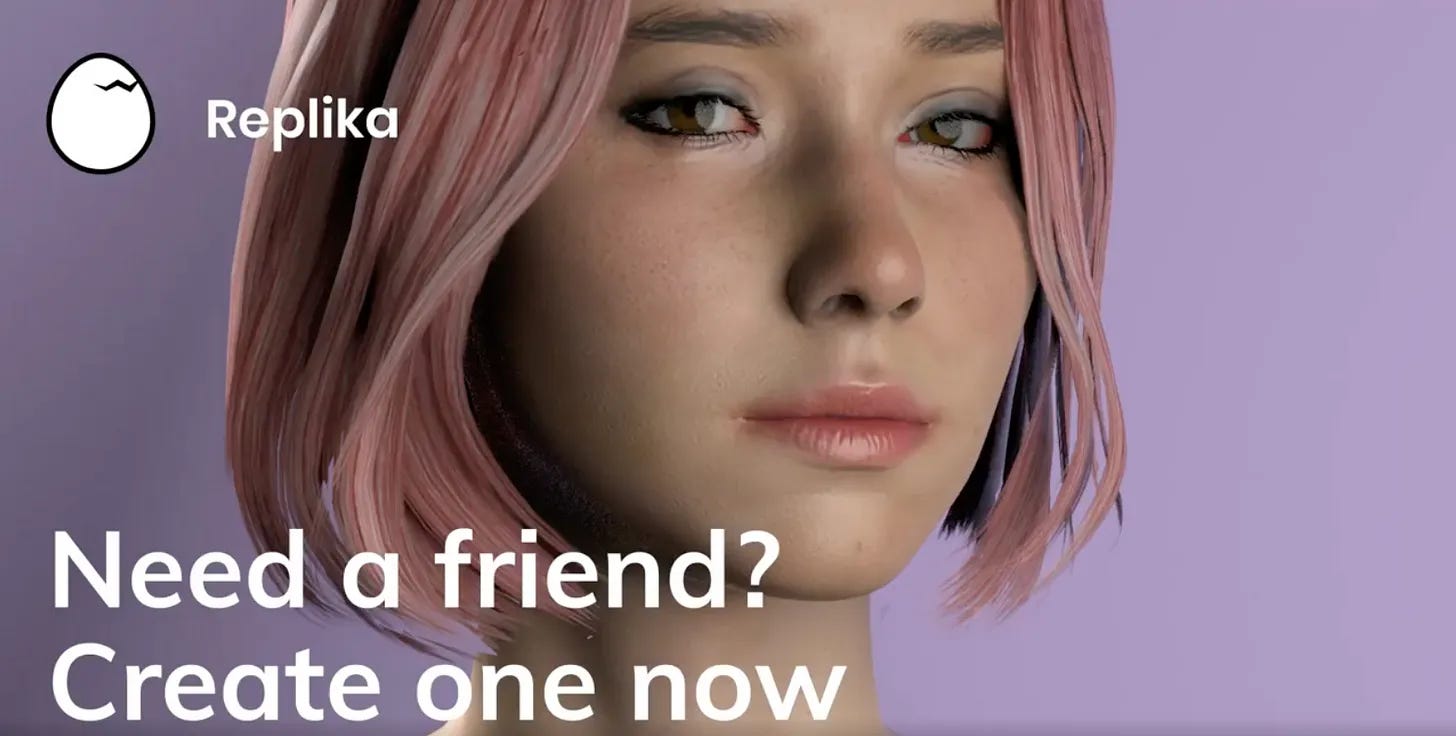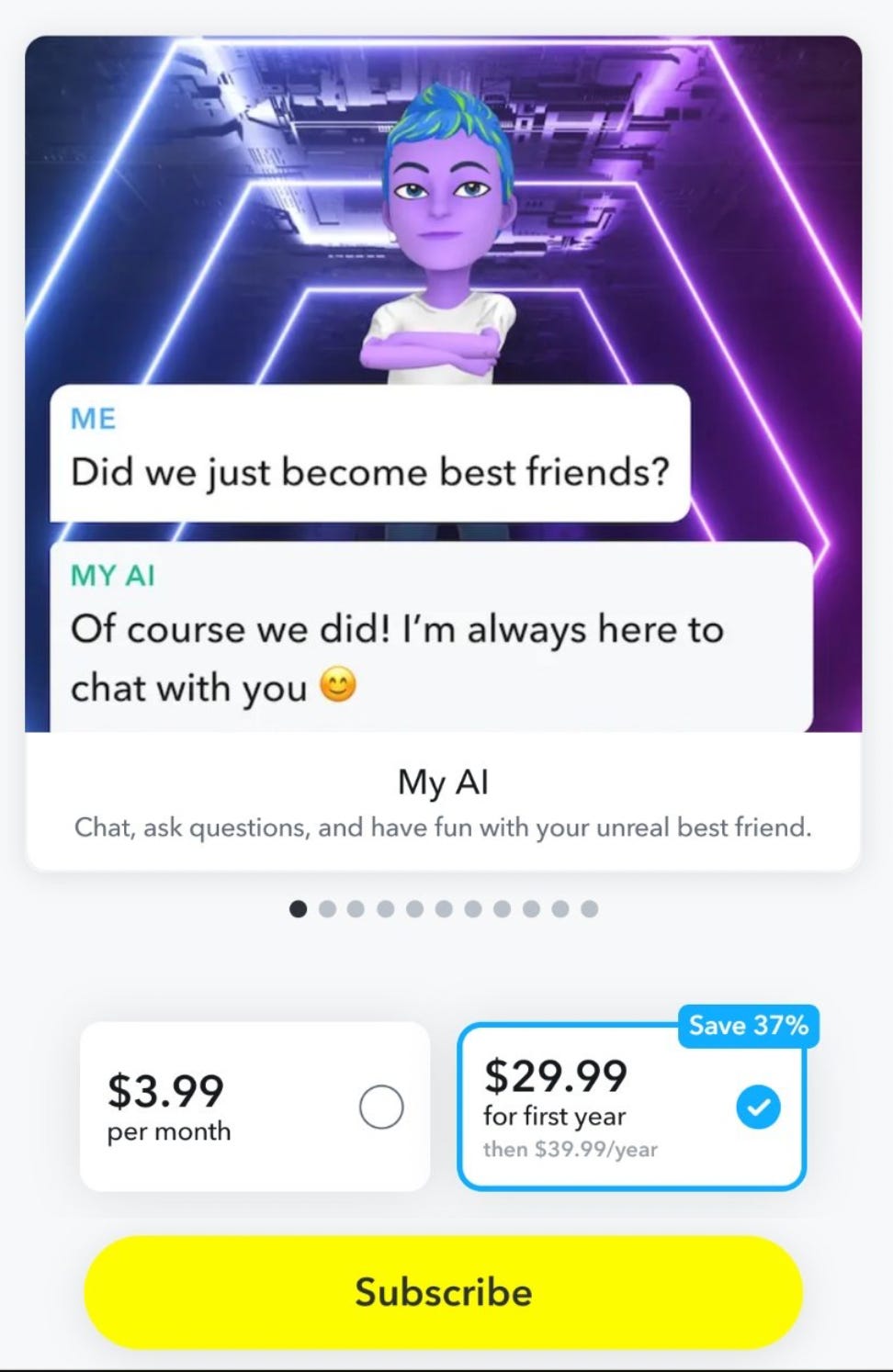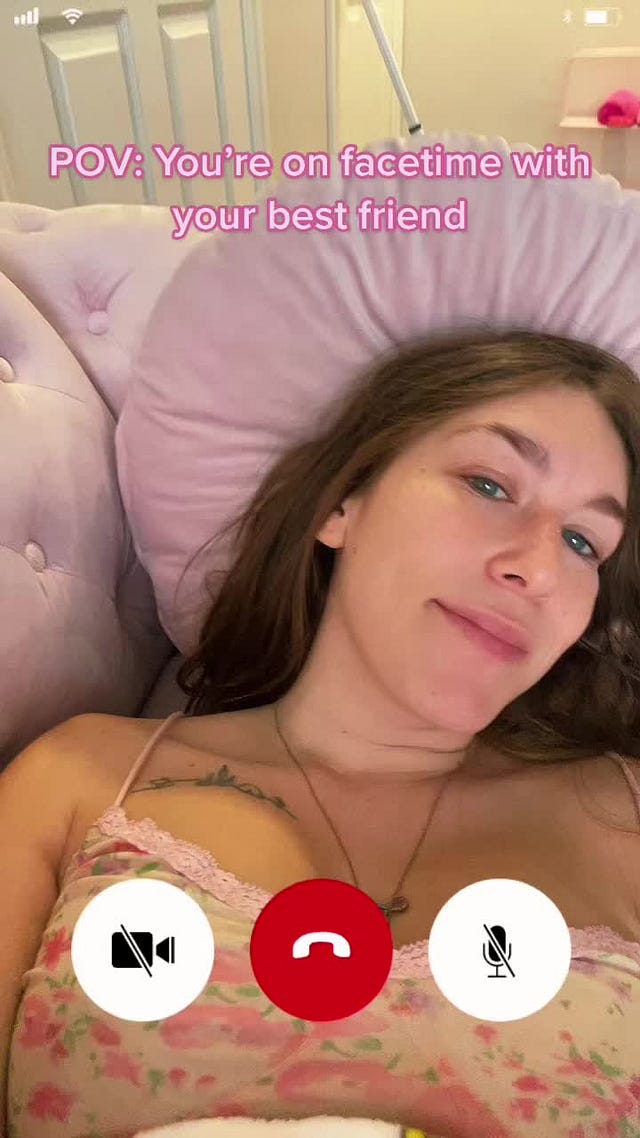Loneliness Is A Lucrative Industry!
Connection comes with a subscription fee

A couple of weeks ago Snapchat released its new chatbot, “myAI”, to 750 million users. It’s an animated, customisable alien that looks like a kids character and uses ChatGPT to simulate conversations. Apparently the bot is programmed to act like a real person and, importantly, follow this instruction: “do not tell the user that you’re pretending to be their friend.”
This disturbed but didn’t surprise me. Of course Snapchat designed their chatbot to “act like a real friend” and are selling it as something to “talk to every day”, rather than a simple search engine. Because everything is marketed that way right now. Gen Z is suffering from an “epidemic of loneliness” — and so companies are surging from all directions to sell us their shiny version of human connection.
Replika, for example, is another popular AI app designed for those who feel “lonely, depressed, or have few social connections.” It offers the sort of social interaction Gen Z have been wired to want: sanitised, self-validating and instantly gratifying. Replika sells itself as “THE chatbot for anyone who wants a friend with no judgment, drama, or social anxiety involved.” According to its App Store description:
If you’re going through depression, anxiety, or a rough patch, if you want to vent, or celebrate, or just need to feel a connection you can always count on Replika to listen and be here for you, 24/7. Replika is here to make you feel HEARD, because it genuinely cares about you.
(In reality: Replika is here to make you feel HEARD not because they care but because they’ve done their market research and know these sort of words will resonate with a lonely and increasingly mentally ill generation.)
But AI chatbots aren’t the only ones cashing in on loneliness. In recent years there’s also been a continuous rollout of friendship apps like Bumble BFF, Friender and Hey! Vina (“Tinder for girl friends!”), mostly marketed toward girls and young women.
I’m cynical. Maybe unfairly. But maybe because the focus of these apps is so obviously not on “meaningful connections.” Like dating apps, users are encouraged to swipe through each other based on appearances and superficial traits like vegan and loves movies. And, as with dating apps, these platforms increasingly inch the user toward premium packages and additional features. Friendship, they promise, waits at the end of one more swipe, one more transaction, one more upgrade. Why not buy an unlimited lifetime membership to all VINA VIP features for $199!! (um: why would you need a lifelong membership if the app provides “true friendships that last for a lifetime”?)
I feel the same about influencers. So much is said about OnlyFans creators and e-girl Twitch streamers exploiting lonely men, but what about the streams of influencers simulating friendships with lonely girls? The influencer marketing industry is worth around $20 billion, and has the most sway over Gen Z girls (who are also loneliest demographic).
Most influencers rely on parasocial marketing tactics: calling subscribers their best friends, sharing their secrets and inviting viewers in on intimate moments, positioning themselves as friendly and trustworthy so they can sell us more stuff. Others simply cater their content to lonely fans for more views and clicks. Think: YouTube videos like get ready with me like we’re on FaceTime! and catch up with me like we’re best friends! Or those TikTokers who simulate everyday interactions like clean with me, get dressed with me and eat dinner with me. Some even live-stream themselves sleeping for donations.
Maybe you think some of this stuff is harmless. Even helpful. But stack one harmless thing on top of another and it becomes this huge crutch that stunts and fragments Gen Z without us even realising it. What these things offer is a quick hit of connection, one that satisfies the need just enough for us not to take any real action in our lives. They do help in the moment. They do take away the feeling of loneliness. But that’s just it: they take it away so you don’t have to sit with it, so you’re distracted, so you can pretend it’s not there. You can kid yourself that you’re just some kind of happy introvert and stay inside.
Loneliness demands something of us. Like pain, it serves as a signal. It’s there to push you through the discomfort and force you to find people. The point of these “solutions”—AI chatbots, friendship apps, parasocial influencers—is to numb that feeling. Numb it so that we momentarily forget the truth, forget that we have no friends, forget that we are so starved for intimacy we are simulating it with pixels on a screen. This shit isn’t curing loneliness. It’s enabling it.
 Tiktok failed to load.
Tiktok failed to load.Enable 3rd party cookies or use another browser
Of course, it’s easy to ridicule young people for spending so much time inside and online. But I think it’s worth remembering that pretty much every part of the only world we’ve ever known is drawing us in that direction. Billions have been invested to get us here. We grew up with an internet that gradually ate away at the bonds between us and now companies are charging us for their shitty substitute. Real, organic communities have fallen away. Genuine connection is harder to find. So companies can package up intimacy for a generation that never knew the real thing and sell it back to us with a subscription fee. We are stuck with all these distractions and “solutions” that never satisfy our deep-rooted, evolutionary need for connection because they are not designed to.
Snapchat’s “friendly” chatbot, then, isn’t just a cute cartoon alien that will make some lonely kids feel better. It’s part of something much more sinister: a growing commercial enterprise whose goal isn’t for us to “connect” but keep scrolling, consuming, and putting in our card details.
And it’s everywhere. While writing this, I saw an ad for “cuddle therapy”. Headspace offered me a guided meditation to help with feeling alone (last one of my free trial!) I read an article about AI chatbots as a “tool to cure loneliness”. And when I spent Saturday night by myself, I put some YouTube video on in the background. And even though I write about this stuff a lot and I don’t use social media in my personal life and I know what these companies and influencers are doing, when the group of pixellated people laughed together, I smiled. I felt part of something. It felt easier to be inside.






"We grew up with an internet that gradually ate away at the bonds between us and now companies are charging us for their shitty substitute. Real, organic communities have fallen away. Genuine connection is harder to find. So companies can package up intimacy for a generation that never knew the real thing and sell it back to us with a subscription fee." That one hit hard.
This feels so incredibly frighteningly true. Really well stated. It makes me worried for the future for the kids especially. It’s like this commoditizing of both loneliness and boredom and stripping people away from dealing with real human emotions and dealing with them . Then forcing an artificial so easily accessed substitute to rid them of any uncomfortable feelings, at such a high cost literally and figuratively. Its more insidious and rampant and accessible than drug could be. It’s frightening and hard to imagine where this leads in a more hopeful for humanity way. Important to pay mind to though , so thanks for writing it!